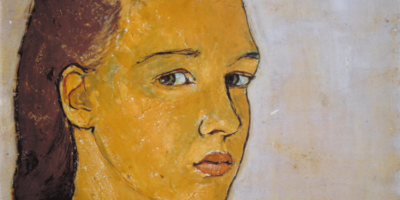“The Marriages Of Jacob: A Poem-Novella”
THE MARRIAGES OF JACOB: A POEM-NOVELLA
by Charlotte Mandel [Micah Publications, 1991, $10]
In The Marriages of Jacob, Charlotte Mandel takes the story etched finely on the surface of Genesis, and weaves about it a mesh of complex and real characters. The result is both original and beautiful.
Mandel’s cycle of poems begins at a moment of profound loss: Leah is about to be married to Jacob in place of the promised Rachel, and the bond that has always existed between the two sisters is about to be rent forever. “Silence veils this bride/ no less than her lowered hood.” Leah, torn from her beloved sister, is sent into the arms of a man who does not love her; Rachel, proud and desperate, can never completely overcome the anguish caused by her father’s trickery. In the intricate cycle of poems that makes up this collection, Mandel presents image after image of the often bitterly entwined lives of these two sisters. The end of the closeness between Leah and Rachel becomes inevitable—for their dependence on Jacob’s favor allows for no further unity. “Tremble of boiling tea/ scalds Leah’s hands./ Since the day of Rachel’s birth,/ but for these seven nights,/ the two have slept as twins.” From this moment, the women will dream and fear separately, and live their lives in mutual competition.
Whether she is dealing with the relationship of Rachel and Leah or the interaction between Jacob and Laban, Mandel’s writing is marked by a complex psychological grasp of character. In Mandel’s version of Genesis, the angel with whom Jacob wrestles is the specter of his brother Esau. As Jacob gazes at the unwanted Leah, the forces that keep him from his beloved Rachel and the troubled legacy of his birthright merge: “He stares with anger/ into [Leah’s] pale blue eyes, / the hunter’s eyes of redhaired Esau, / his brother.” Leah is irritant and victim, isolated and reluctantly beloved. “Leah shrinks from Jacob’s fists/ clenched at the edge of his dream/ where he wrestles naked/ with another man, twin, / with hairy arms and chest . . . in the distance—/ a highpitched/ razoring scream/ of a riven animal/ or a woman.”
And Rachel? In Mandel’s vision she is no less tormented, blind to anything but the abhorred childlessness that is made all the more shameful by her sister’s triumphant fertility. “Rachel tightens knots at the loom/ and will not touch [Leah’s children’s] grimy/ dimpled fists, or smile/ into their shining/ eyes dark as Jacob’s.”
Mandel’s poems move us through the pregnancies of the sisters and the cycles of their desperate jealousies. Some of her most powerful scenes recount Rachel’s supplications to her idols for fertility, or the chants of midwives while Leah labors. The handmaids Bilhah and Zilpah, beautifully alive and three-dimensional in Mandel’s text, sing to their multiple gods and goddesses as Rachel and Leah sing to their one (“through the warp of living sinews, / four women weave like vines/ pliant, binding, thirsty”).
Mandel picks a sure-footed path among the spaces left by the biblical text. A pregnant Rachel imagines the face of her own mother, who died giving birth to her; after Rachel has deceived her father, hiding her stolen idols in her saddlebags and claiming she cannot rise because of her menstrual pains, her ill-fated pregnancy with Benjamin takes its turn for the worse: “Her face grows gaunt on the journey,/ limestone white./ Only Meyaledet knows she pads herself,/ staining untimely,/ as though the lie told to her father/ becomes, in retribution, truth.” At moments, Mandel’s sensibility is perhaps more reminiscent of the magical realism of Gabriel Garcia Maiquez than of the sparseness of Genesis.
Mandel’s poem-novella makes tangible the archetypical treacheries of Genesis. “We are a family of brittle gifts,” says Jacob. And it is in this phrase that the tremulous beauty of Mandel’s vision is distilled. What Mandel has accomplished in The Marriages of Jacob is not to be overlooked: bringing us from the marriage of Jacob and Leah to the death of Rachel on the road to Efrat, this book is a raw, multivocal rendition of a familiar story. The unity and rending apart of these women, their jealousies and joys and pains, form a feverish and emotionally compelling biblical landscape. Mandel’s Leah and Rachel, her Bilhah and Zilpah and Jacob, are anything but two-dimensional, making The Marriages of Jacob startling to read, memorable, often breathtaking.


